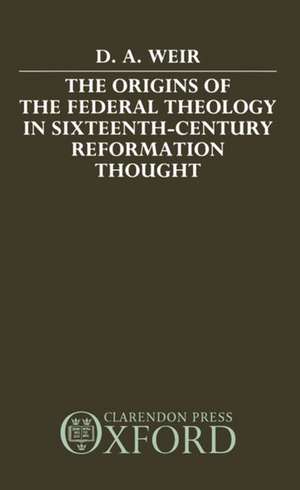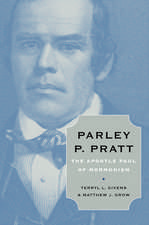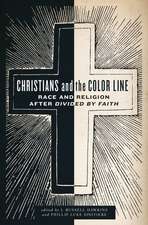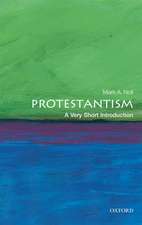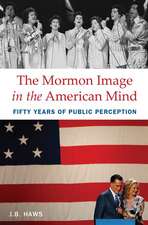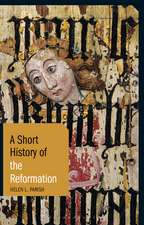The Origins of the Federal Theology in Sixteenth-Century Reformation Thought
Autor David A. Weiren Limba Engleză Hardback – mar 1990
Preț: 860.09 lei
Preț vechi: 1307.57 lei
-34% Nou
Puncte Express: 1290
Preț estimativ în valută:
164.57€ • 172.29$ • 136.18£
164.57€ • 172.29$ • 136.18£
Carte tipărită la comandă
Livrare economică 26 martie-01 aprilie
Preluare comenzi: 021 569.72.76
Specificații
ISBN-13: 9780198266907
ISBN-10: 0198266901
Pagini: 262
Ilustrații: 1 black and white illustration, 1 table
Dimensiuni: 147 x 225 x 20 mm
Greutate: 0.45 kg
Editura: Clarendon Press
Colecția Clarendon Press
Locul publicării:Oxford, United Kingdom
ISBN-10: 0198266901
Pagini: 262
Ilustrații: 1 black and white illustration, 1 table
Dimensiuni: 147 x 225 x 20 mm
Greutate: 0.45 kg
Editura: Clarendon Press
Colecția Clarendon Press
Locul publicării:Oxford, United Kingdom
Recenzii
`without doubt a milestone in the dogma-historical research on the covenant. ... The bibliography is superb, and is updated till 1989. It is helpful not only for students of covenant theology per se, but also for related topics, such as Puritanism, Ramist influence in Calvinist thought, and the sacraments in Reformed theology. This bibliography alone already makes the book invaluable! ... The study is, in various ways, stimulating and perhaps even provocative. ... Weir has presented us with a stimulating and carefully researched study.'Teh Evangelical Quarterly
` Although this work will not be the last word on the subject, it certainly is the latest word and no future discussion of this important topic will dare ignore it. ... Because of Weir's solid relationship, there is hope that a consensus on this important subject can be reached in the relatively near future.'Journal of Religious History.
'Professor Weir has performed a valuable service ... The author provides a plain and accurate account of the doctrinal distinctives of covenant theology.'Paul Helm, The Banner of Truth
'a fine example of the genre of historical theology ... Weir's thorough and careful scholarship has produced an essential book for students of Reformation thought, especially for those who wrestle with the problem of the covenants.'Dewey D. Wallace, Jr, George Washington University, American Historical Review, December 1991
'This is a useful work.'John Van Engen, University of Notre Dame, The Historian
'David Weir's volume on the origins of federal theology offers a useful ... survey of the early Reformed discussion of a prelapsarian covenant. The volume provides a most valuable bibliography, and it offers what is probably the most extended treatment extant of early Reformed discussion of the covenenant of nature, covenant of works, and related terms.'Richard A. Muller, Fuller Theological Seminary, The Journal of Religion
'I am seldom as engrossed after reading the first few pages of a book as I was upon first picking up this fascinating book. From an historical point of view I found this book very informative and useful, and highly stimulating.'Stephen C. Perks, Calvinism Today, Vol. III, No. 4, October 1993
` Although this work will not be the last word on the subject, it certainly is the latest word and no future discussion of this important topic will dare ignore it. ... Because of Weir's solid relationship, there is hope that a consensus on this important subject can be reached in the relatively near future.'Journal of Religious History.
'Professor Weir has performed a valuable service ... The author provides a plain and accurate account of the doctrinal distinctives of covenant theology.'Paul Helm, The Banner of Truth
'a fine example of the genre of historical theology ... Weir's thorough and careful scholarship has produced an essential book for students of Reformation thought, especially for those who wrestle with the problem of the covenants.'Dewey D. Wallace, Jr, George Washington University, American Historical Review, December 1991
'This is a useful work.'John Van Engen, University of Notre Dame, The Historian
'David Weir's volume on the origins of federal theology offers a useful ... survey of the early Reformed discussion of a prelapsarian covenant. The volume provides a most valuable bibliography, and it offers what is probably the most extended treatment extant of early Reformed discussion of the covenenant of nature, covenant of works, and related terms.'Richard A. Muller, Fuller Theological Seminary, The Journal of Religion
'I am seldom as engrossed after reading the first few pages of a book as I was upon first picking up this fascinating book. From an historical point of view I found this book very informative and useful, and highly stimulating.'Stephen C. Perks, Calvinism Today, Vol. III, No. 4, October 1993
